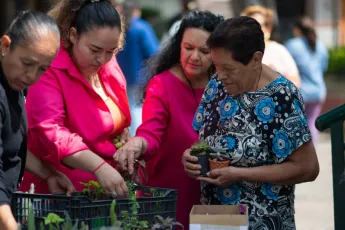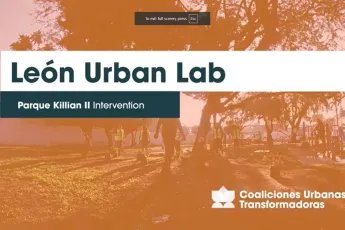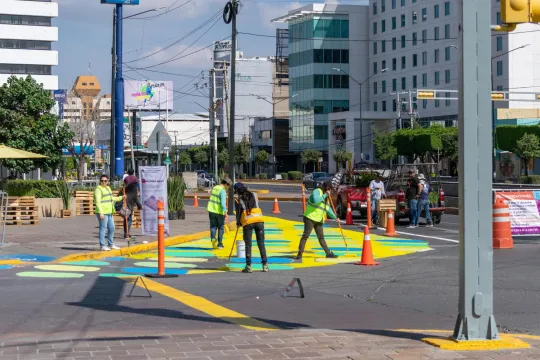
Women residents of Barrio Arriba, participating in a composting workshop under the TUC initiative. © Héctor Ríos
In León, two of its oldest neighbourhoods, 'Barrio Arriba' and 'El Coecillo' (close to the Killian II neighbourhood), have been selected for innovative projects led by the León Urban Lab. Despite these neighbourhoods’ past as important industrial centres, relocating these economic activities has left these areas with environmental and urban challenges. However, their sociocultural roots remain a strength.
Under the Transformative Urban Coalitions (TUC) initiative, low-cost and easy-to-implement experimental projects were developed to adapt these neighbourhoods to climate change, with the active participation of the community.
Barrio Arriba: Towards a zero-waste community
Community leaders emerged in Barrio Arriba, especially women, and became involved in the project’s management. Capacity-building sessions on composting, waste management, recycling and home vegetable gardens were held to create a community urban garden that serves as an environmental education centre. Lourdes Refugio Martínez, a member of the Obregón neighbourhood association, highlights the importance of community participation in reducing waste through recycling.
The women of the Barrio Arriba’s neighbourhood association have also promoted cultural, artistic and environmental strategies, organizing activities such as air quality measurements and climate risk mapping, following the Urban Lab’s capacity-building sessions.
Killian II: Reforestation and improvement of public spaces
In the Killian II neighbourhood, one of the most marginalized areas in León, the project focused on the adaptation and reforestation of green space to improve air quality, mitigate the heat island effect, allow water infiltration into the subsoil, conserve biodiversity and improve the soil quality. Led by women and children, the community actively participated in the activities, planting trees and flowers, renovating green areas, installing covered benches and improving recreational and sports spaces.
These actions resulted from a community co-design workshop with a gender perspective, ensuring that public spaces were inclusive and safe. In addition, capacity-building sessions on urban biodiversity were provided, highlighting the importance of native vegetation and a nearby stream’s environmental and social benefits.
Results and reflections
These interventions in León have improved living conditions, promoted sustainability in historic and marginalized neighborhoods, and have also demonstrated the power of community. Women's leadership and participation have been crucial, highlighting a comprehensive approach that addresses environmental and socioeconomic issues.
Community capacity-building has empowered residents with the technical skills and knowledge to manage and maintain these actions, promoting greater environmental awareness and responsibility. Thus, these initiatives transform the present and ensure a sustainable future for local communities.

